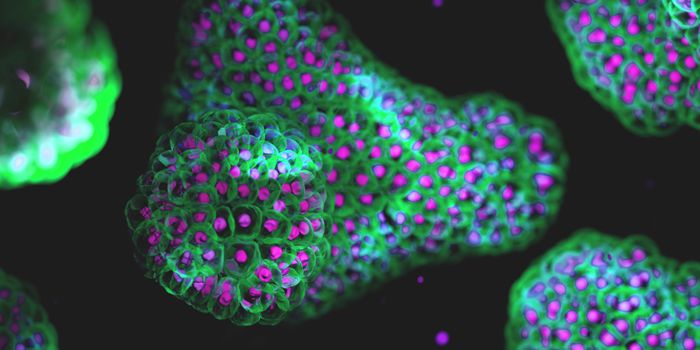Gut Immune Cells Migrate to Brain & Are Linked to Alzheimer's
The gastrointestinal tract is the biggest immune organ in mammals. The gut extends its influence all over the body through various links like the gut-liver axis, the gut-lung axis, and the gut-brain axis, and it also contains the trillions of microbes that compose the gut microbiome. Scientists have now used a mouse model of Alzheimer’s disease to show that immune cells from the gut can migrate to the brain through the gut-brain axis. This connection could present new therapeutic options for the neurodegenerative disorder, if we learn how it works. These findings have been published in Cell Reports.
Previous research has linked disruptions or imbalances in the gut microbiome to a wide variety of diseases, including Alzheimer’s. This study revealed that the levels of certain B cells, which can generate antibodies, were unusually low in a mouse model of Alzheimer’s. These antibody-generating B cells normally work to maintain balance, or homeostasis, between the gut microbiome and immune system.
These B cells were found to be migrating; they were from the gut, but ending up in the brain and a neighboring region called the meningeal dura mater.
"Remarkably, we found that these immune cells in the brain border which recognize bacteria living in the intestines were accumulating in the [Alzheimer's] brain," noted first study author and postdoctoral fellow Priya Makhijani, Ph.D.
A binding site for this gut immune cell, which is a chemokine characterized by migration, was generated by inflammatory glial cells in the mouse model. After searching through data from previous studies, the researchers identified this migratory signature in the brains of human Alzheimer’s patients.
The research also showed that when this mouse model was given a diet high in fiber, balance in the gut microbiome was restored and certain symptoms of Alzheimer’s, like tremor and frailty, were reduced. Although plaques in the brains did not get smaller, other metrics suggested that their health had improved in a variety of ways.
"This paper brings the gut immune system to the forefront of neurodegenerative disease pathology," said co-senior study author Daniel Winer, MD, an associate professor at the Buck Institute for Research on Aging.
More research will be needed to explore the significance of these findings, but the investigators suggested that as age-related problems arise in the brain, signals may be sent that attracts the attention of the gut immune system, which sends cells to assist. This process might initially be protective, but then causes problems over time.
The investigators also want to learn more about whether altering the gut microbiome could be one way to prevent or treat neurodegenerative diseases. There could be certain bacteria that trigger inflammation, or chemokines that set off problematic pathways, and it may be possible to target those processes, for example.
Sources: Buck Institute for Research on Aging, Cell Reports









